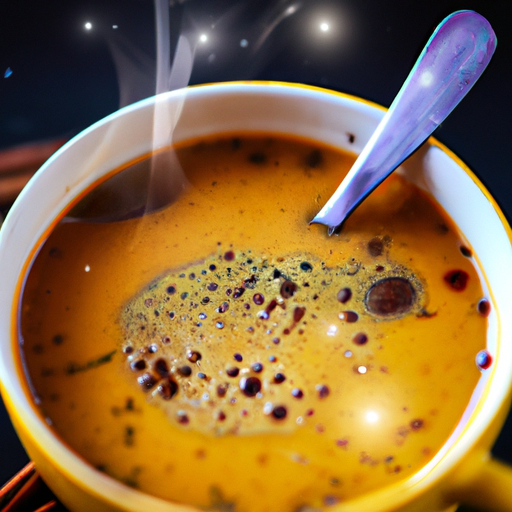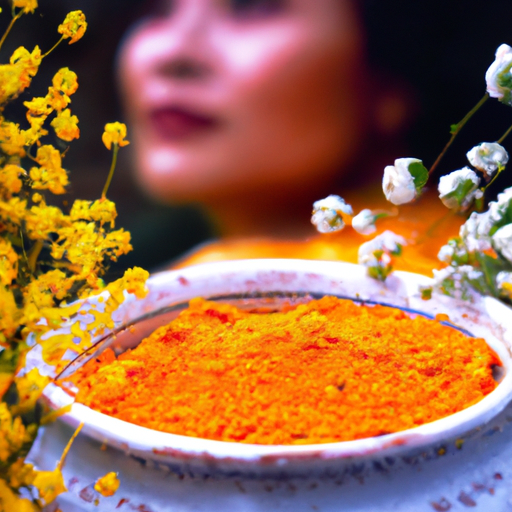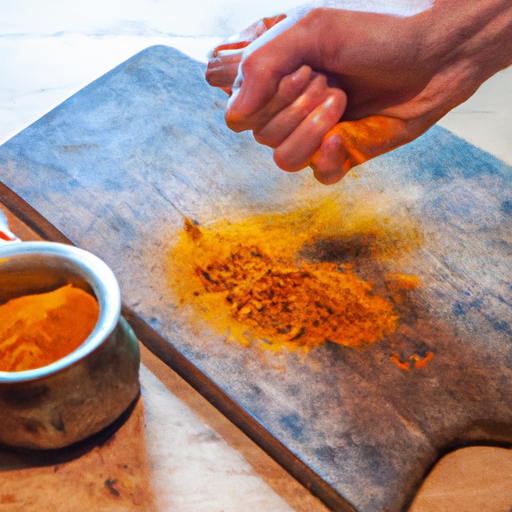I know what you’re thinking – why do I need to sweeten my turmeric tea? Turmeric is known for its earthy, slightly bitter taste, and adding sweeteners might seem unnecessary. But trust me, a touch of sweetness can really elevate the flavor of your turmeric tea and make it more enjoyable to sip on.
Now, you might be concerned about the health implications of adding sweeteners to your tea. After all, we all know that excess sugar is not good for us. But fear not, because I’ve done my research and found the best sweeteners to use in turmeric tea that not only add a delightful sweetness but also come with some health benefits.
From natural options like honey and maple syrup to low-calorie alternatives like stevia and monk fruit, I’ve got you covered. Even if you’re watching your sugar intake, there are options like coconut sugar, agave nectar, and date syrup that you can explore.
So, if you’re ready to enhance the taste of your turmeric tea without compromising your health, keep reading to discover the best sweeteners that will take your tea-drinking experience to the next level.
Key Takeaways
- Honey, maple syrup, stevia, and monk fruit are all excellent choices for sweetening turmeric tea.
- These natural sweeteners provide a delightful sweetness while also offering health benefits, such as antioxidants and minerals.
- Coconut sugar and agave nectar are also suitable options, as they have a low glycemic index and do not cause a rapid increase in blood sugar levels.
- Date syrup is a rich and velvety natural sweetener that pairs well with turmeric tea, offering a unique flavor profile and the added benefits of natural sugars, minerals, and antioxidants.
Honey
If you’re looking for a scrumptious and natural sweetener to enhance the flavor of your turmeric tea, honey is the way to go! Not only does honey provide a delightful sweetness, but it also offers a range of health benefits.
When added to turmeric tea, honey acts as a natural cough suppressant, soothing a sore throat and providing relief from cold symptoms. It also contains antioxidants and antimicrobial properties, which can help boost your immune system and fight off infections.
When choosing the best honey for turmeric tea, it’s important to opt for raw and unfiltered varieties. Raw honey retains its natural enzymes and nutrients, ensuring maximum health benefits. Unfiltered honey contains pollen, bee propolis, and royal jelly, which provide additional antibacterial and antiviral properties. Look for honey that is labeled as organic and free from additives or preservatives.
Now, let’s transition to another great sweetener for turmeric tea – maple syrup.
Maple syrup
Maple syrup complements the flavor of turmeric tea with its natural sweetness. Not only does it enhance the taste, but maple syrup also offers several health benefits. Rich in antioxidants and minerals like zinc and manganese, it provides a nutritious alternative to refined sugar. The table below compares the nutritional content of maple syrup with honey and white sugar:
| Nutrient | Maple Syrup | Honey | White Sugar |
|---|---|---|---|
| Calories | 52 | 64 | 49 |
| Antioxidants | Yes | Yes | No |
| Minerals | Zinc, | None | None |
| Manganese, | |||
| Calcium |
While maple syrup is a popular sweetener, there are other alternatives to consider. If you’re looking for a lower-calorie option, you could try Stevia, a natural, zero-calorie sweetener derived from the Stevia plant. Stevia can be a suitable choice for those watching their sugar intake or managing diabetes. Transitioning into the next section, let’s explore the benefits and uses of stevia in turmeric tea.
Stevia
You may think you’ve found the perfect sweetener, but Stevia might just surprise you with its unique taste and health benefits. Stevia is a natural sweetener derived from the Stevia rebaudiana plant.
One of the main advantages of using Stevia is its zero-calorie nature, making it a great option for those looking to cut down on sugar and reduce their calorie intake. Additionally, Stevia has been found to have a negligible impact on blood sugar levels, making it a suitable choice for individuals with diabetes or those following a low-carb diet.
In terms of taste, Stevia has a subtle sweetness that is often described as slightly herbal or licorice-like. It can take some getting used to, especially if you’re accustomed to the intense sweetness of traditional sugar. However, many people find that Stevia enhances the flavor of turmeric tea without overpowering it.
When comparing Stevia to other natural sweeteners, such as maple syrup or honey, Stevia comes out on top in terms of its health benefits. While maple syrup and honey do offer some trace minerals and antioxidants, they are still high in calories and can cause blood sugar spikes. Stevia, on the other hand, provides sweetness without the negative effects on blood sugar and calorie intake.
Transitioning to the next section about monk fruit, another popular natural sweetener…
Monk fruit
When it comes to finding a natural sweetener that won’t spike your blood sugar levels, monk fruit is the way to go. This sweetener is derived from the monk fruit, also known as Luo Han Guo, which is a small green gourd native to Southeast Asia.
Monk fruit has gained popularity in recent years due to its zero-calorie nature and its ability to sweeten without causing a rapid increase in blood sugar levels. Here are some benefits of using monk fruit as a sweetener:
- Zero calories: Monk fruit extract contains no calories, making it a great option for those watching their calorie intake.
- Natural sweetness: Monk fruit extract is incredibly sweet, even more so than sugar, so you only need a small amount to achieve the desired level of sweetness.
- Antioxidant properties: Monk fruit contains antioxidants called mogrosides, which have been shown to have anti-inflammatory and anti-cancer effects.
If you’re looking for alternatives to monk fruit, there are a few options to consider. Stevia, which was discussed in the previous subtopic, is another natural sweetener that doesn’t raise blood sugar levels. Erythritol is a sugar alcohol that provides sweetness without the calories, and it doesn’t have the same digestive issues as other sugar alcohols. Another alternative is xylitol, which has a similar sweetness to sugar and can be used in a 1:1 ratio.
Now, let’s move on to the next sweetener, coconut sugar, which is another popular choice for adding sweetness to turmeric tea.
Coconut sugar
Coconut sugar, a sweetener derived from the sap of coconut palm trees, offers a natural and flavorful addition to your favorite beverages. It’s gained popularity as a healthier alternative to refined sugar due to its low glycemic index and higher nutrient content. Coconut sugar contains essential minerals such as potassium, iron, zinc, and calcium, which aren’t found in regular table sugar. These minerals play a vital role in maintaining overall health and well-being.
One of the significant advantages of using coconut sugar as a sweetener in turmeric tea is its low glycemic index. This means it causes a slower rise in blood sugar levels compared to refined sugar, making it a suitable option for individuals with diabetes or those looking to manage their blood sugar levels. Additionally, coconut sugar has a rich caramel-like flavor that enhances the taste of turmeric tea without overpowering it.
While coconut sugar is a great option, it’s essential to remember that there are other alternatives available. Some people may prefer the taste of honey or maple syrup, which also offer some health benefits. However, if you’re looking for a natural sweetener with a unique flavor profile and added nutrients, coconut sugar is an excellent choice.
Transitioning to the next section, another popular sweetener option for turmeric tea is agave nectar.
Agave nectar
Agave nectar, with its golden hue and smooth texture, adds a touch of natural sweetness to your warm cup of turmeric-infused goodness. It not only enhances the flavor of turmeric tea but also provides several health benefits.
Agave nectar is low on the glycemic index, meaning it has a minimal impact on blood sugar levels compared to other sweeteners. This makes it a suitable option for individuals with diabetes or those watching their sugar intake. Additionally, it contains trace amounts of vitamins and minerals, including calcium and potassium.
When it comes to using agave nectar in baking, it can be a great alternative to traditional sweeteners like white sugar or brown sugar. Its liquid form makes it easy to incorporate into recipes, and its mild taste doesn’t overpower the other flavors. However, it is important to note that agave nectar is still a form of sugar and should be consumed in moderation.
In terms of taste and nutritional value, agave nectar differs from other natural sweeteners like honey or maple syrup. While honey and maple syrup have distinct flavors, agave nectar has a more neutral taste that allows the turmeric to shine. Nutritionally, agave nectar is lower in calories compared to honey and maple syrup.
Transitioning into the next section about ‘date syrup’, another natural sweetener that pairs well with turmeric tea, let’s explore its unique qualities and benefits.
Date syrup
Indulge your taste buds with the rich and velvety date syrup, a luscious natural sweetener that perfectly complements the warm and earthy notes of your turmeric-infused beverage. Using date syrup as a natural sweetener in turmeric tea offers numerous benefits. Not only does it add a delightful sweetness, but it also brings its own unique flavor profile to the mix.
Date syrup is made from the concentrated juice of dates, resulting in a thick and syrupy consistency. It is packed with natural sugars, minerals, and antioxidants, making it a healthier alternative to refined sugar. The natural sweetness of date syrup enhances the flavor of turmeric tea without overpowering it, creating a harmonious balance of flavors.
When using date syrup in turmeric tea, you can explore different flavor profiles depending on the type of date syrup you choose. Some varieties have a caramel-like taste, while others have a deep, molasses-like flavor. The choice of date syrup can influence the overall taste of your turmeric tea, allowing you to tailor the experience to your liking.
To give you a better idea of the different flavor profiles, here is a comparison table:
| Type of Date Syrup | Flavor Profile |
|---|---|
| Medjool Date Syrup | Rich, caramel-like taste |
| Deglet Noor Syrup | Lighter, honey-like flavor |
| Barhi Date Syrup | Intense, fruity notes |
By incorporating date syrup into your turmeric tea, you not only sweeten your beverage naturally but also introduce an array of flavors that can elevate your drinking experience. So go ahead, indulge in the velvety sweetness of date syrup in your turmeric tea and savor the delightful combination of warm spices and natural sweetness.
Frequently Asked Questions
Can I use regular sugar as a sweetener in turmeric tea?
Regular sugar can be used as a sweetener in turmeric tea, but it may impact blood sugar levels due to its high glycemic index. However, there are alternative sweeteners with lower glycemic indexes that are better suited for turmeric tea.
Are there any health benefits associated with using honey as a sweetener in turmeric tea?
Using honey as a sweetener in turmeric tea offers health benefits such as antioxidant and anti-inflammatory properties. However, alternatives like maple syrup or stevia can also be used for a lower glycemic index.
How does the taste of maple syrup complement the flavor of turmeric tea?
Does maple syrup enhance the flavor of turmeric tea? The taste of honey in turmeric tea is sweet, while exploring the health benefits of maple syrup in turmeric tea adds a rich, earthy sweetness.
Can stevia be used as a substitute for other sweeteners in turmeric tea?
Yes, stevia can be used as an alternative sweetener in turmeric tea. It is a natural, calorie-free option that can provide sweetness without affecting blood sugar levels. However, some people prefer the added health benefits of honey in turmeric tea.
Is monk fruit a suitable sweetener option for individuals following a low-carb or keto diet?
Monk fruit is a great low-carb sweetener option for those following a keto or low-carb diet. It provides a natural sweetness without the added carbs and calories. Other alternatives with similar benefits include erythritol and stevia.
Conclusion
In conclusion, when it comes to choosing the best sweetener for your turmeric tea, there are several options to consider. Honey, maple syrup, stevia, monk fruit, coconut sugar, agave nectar, and date syrup all provide a natural and flavorful alternative to refined sugar. Each sweetener has its own unique taste and health benefits, so it’s important to choose one that aligns with your personal preferences and dietary needs. Ultimately, the decision is yours, but by exploring these options, you can enhance the taste and nutritional value of your turmeric tea.
Remember, moderation is key when sweetening any beverage. So, go ahead and enjoy your cup of turmeric tea with a touch of sweetness, knowing that you’ve made a mindful choice for your well-being.










